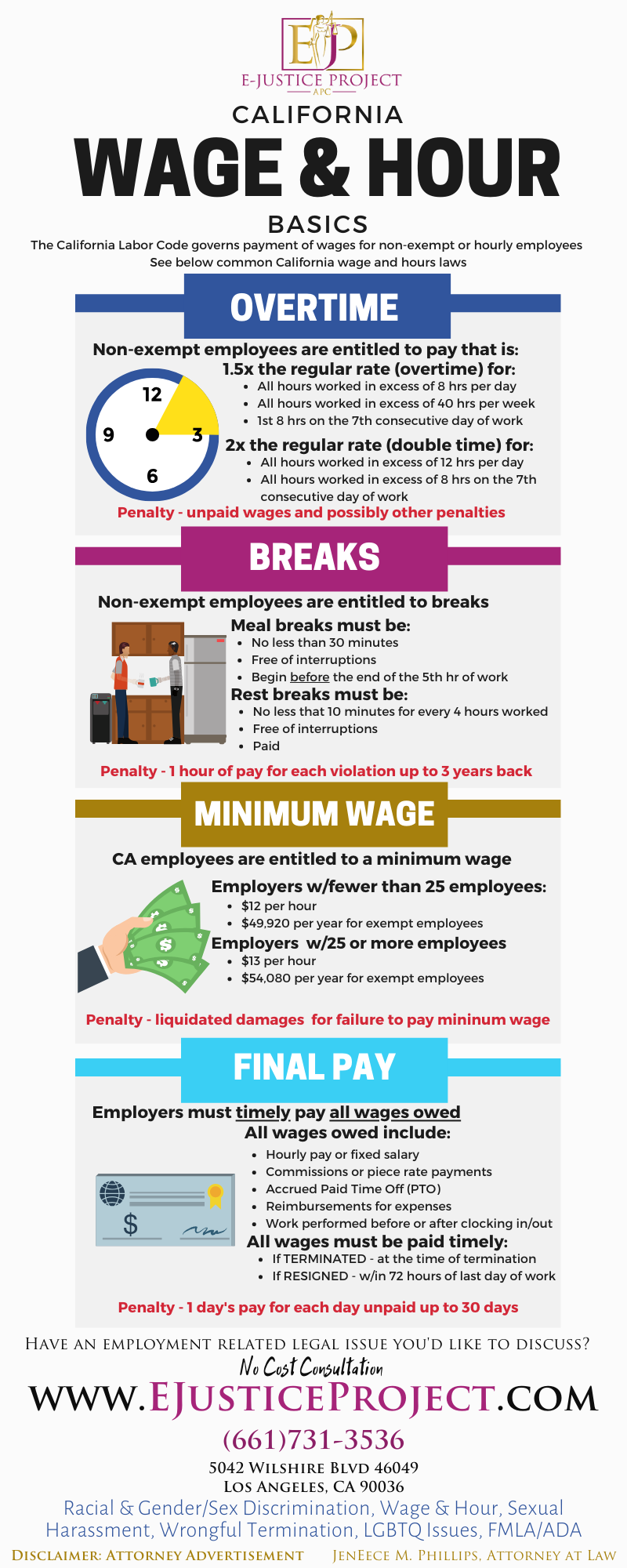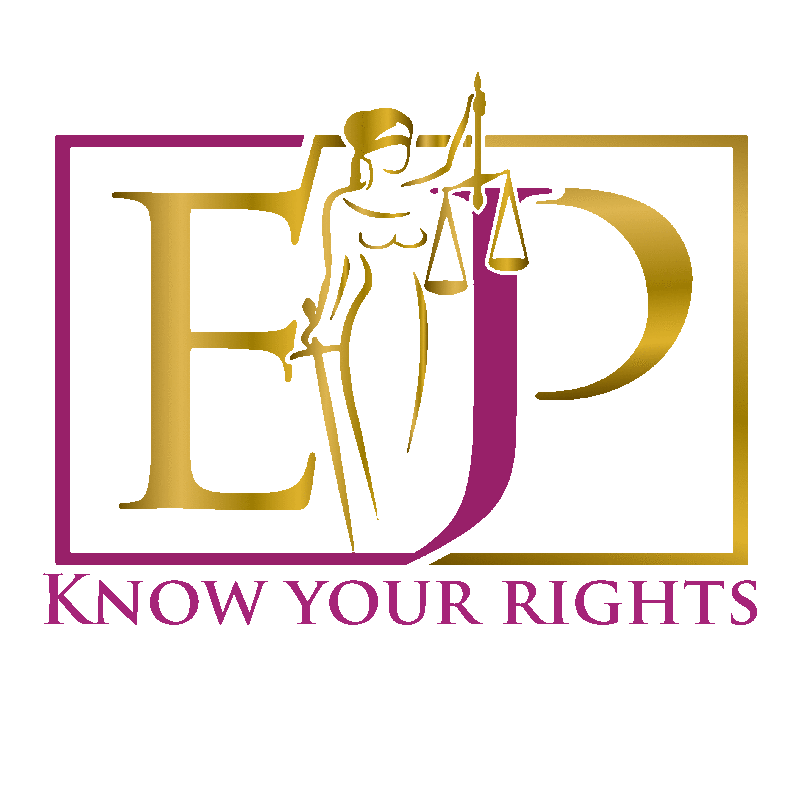Meal & Rest Breaks
Common violations
Missed breaks
Interrupted breaks
Late meal breaks
Unpaid penalties
Meal and rest break law is a subcategory of Wage and Hour law which covers issues surrounding pay. Employer failures to properly apply and adhere to application of California’s various wage and hour laws surrounding meal and rest breaks is a common problem faced by California Employees and why EJP features it in its own category.
California law requires all California employers to ensure non-exempt employees are afforded regular, legally compliant meal and rest breaks.
What is a legally compliant REST break?
California law requires employers to provide an uninterrupted, duty free break of no less than ten (10) minutes for every four (4) hours worked or major fraction thereof. This means in a workday between six (6) and eight (8) hours an employee should have at least two (2), ten (10) minute rest breaks. If the employer provides a longer break that’s okay, but the break must be at least ten (10) minutes long. The employee is entitled to a third ten (10) minute rest break at 10 hours. An employer cannot combine breaks either. For example an employer cannot substitute two (2), ten (10) minute breaks for one long twenty (20) minute break.
See EJP’s Wage & Hour Infographic below for more on Meal and Rest Break law and other Wage & Hour Basics
The rest period should be duty free. This means that the employee must be free to do as they please and not be expected to perform any work while on their rest period. This includes manning phones, assisting customers, or performing any other work while on a rest break.
The rest period should be completely uninterrupted. This means the employee cannot have to start and stop their rest break to perform work. That includes answering questions from customers or coworkers, answering phones, or otherwise performing work. Often times this means the break will need to be taken away from the working area to ensure it is uninterrupted. To aid in fulfilling these requirements, employers are encouraged to have a designated break space (such as a break room) where employees can go to have an uninterrupted break
Rest periods must be paid. Even if an employee is required to clock in and out, the employee must be paid for the rest period. Even though rest breaks are paid, an employer may NOT require their employees to remain on site for their rest break.
What is a legally compliant MEAL break?
California law requires employees to provide a meal period of no less than 30 minutes to every non-exempt employee who works at least six hours. The meal period must be started before the end of the 5th hour of work. After 10 hours of work, the employee is entitled to a second meal break.
Meal breaks must be no less than thirty (30) minutes. A meal break that is even one (1) or two (2) minutes short is considered a violation. Employers are required to keep accurate records of when meal breaks are taken and for how long, including recording the start and end time of each meal break. It is not sufficient to merely indicate the break was taken or that a 30 minute break was taken - the record must actually include a start and end time for each meal break as well as a start and end time for the shift.
The meal break must be timely, meaning that it must start before the end of the 5th hour of work. Meal periods that start after the end of the 5th hour of work are not legally compliant. For example, if a shift begins at 8am, the meal break should start before 1pm - A meal break that begins at 1pm or after, would be a violation. Even just 1 or 2 minutes after the end of the 5th hour of work is a violation.
The meal break must be duty free. This means that the employee must not be expected to perform any work while on their meal break. Employees are permitted to leave the employer’s premises for a meal break and cannot be required to take their meal break on-site.
The meal break should be completely uninterrupted. This means the employee cannot have to start and stop their meal break to perform work. That includes answering questions from customers or coworkers, answering phones, or otherwise performing work. Often times this means the break will need to be taken away from the working area to ensure it is uninterrupted. To aid in fulfilling these requirements, employers are encouraged to have a designated break space (such as a break room) where employees can go to have an uninterrupted meal break. An employer may NOT require their employees to remain on site for their rest break.
What happens if I don’t get meal or rest breaks?
Employees are entitled to recover “premium pay” in the form of a penalty equivalent to 1 hour of pay for every missed or non-legally compliant meal and rest break going back as many as 3 years. A thorough review of payroll records by someone who knows the law can uncover meal and rest breaks violations.
California also has laws regarding a breastfeeding employee’s right to take additional breaks for expressing breast milk. In addition to having to provide individuals with additional breaks to express breast milk employers must also provide lactation stations. Lactation stations must be close to the employee’s work station, must include electricity and other resources needed to operate a breast pump, be shielded from view, and free from intrusion. The lactation station can not be a bathroom.
RETALIATION
Additionally, California law protects employees from retaliation for exercising their rights, such as complaining that they do not get the legally compliant meal and rest breaks they are entitled to. A labor and employment Attorney can obtain your employee file and conduct a review of your payroll records to see if you’re entitled to penalty pay or other damages.
Click here to schedule a no cost consultation with an Attorney
Laws protecting California Employees From
Wage & Hour Violations
There are several laws which protect California employees from wage & hour violations. Here are a few:
Federal Labor Standards Act (FLSA)
California Labor Code
California Wage Orders
For more information click the “learn more” button or CLICK HERE to schedule a no cost consultation with an Attorney
How Can The Employment Justice Project Help?
Listen
Educate you on your rights and possible claims
Educate your employer on your rights and their responsibilities under the law
Counsel and Advise
Address issues of retaliation and wrongful termination
Advocate on your behalf
Advocate employer changes its policies and practices
Request your employee file
Review payroll records for violations
Review personnel file for evidence
Negotiate recovery of unpaid wages and penalties
Negotiate terms of severance or settlement
Negotiate a neutral reference and other favorable terms
Litigate, if appropriate and necessary
Click here to learn more or to speak with an Attorney









